2018-2019学年江西省宜丰中学高一下学期第一次月考英语试卷
- 格式:doc
- 大小:86.00 KB
- 文档页数:15
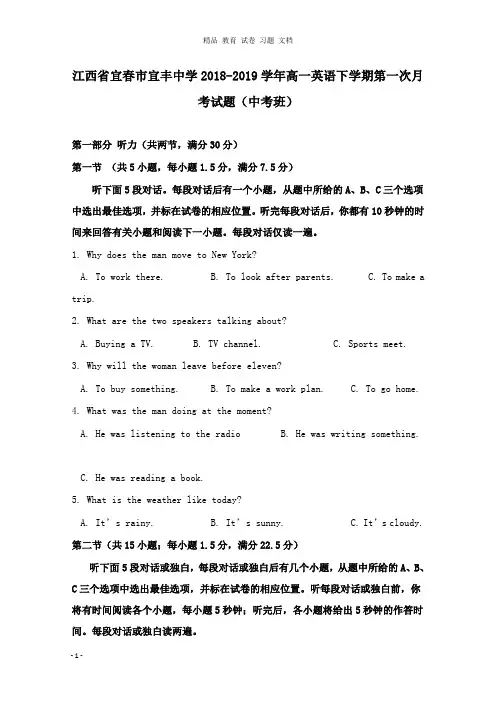
江西省宜春市宜丰中学2018-2019学年高一英语下学期第一次月考试题(中考班)第一部分听力(共两节,满分30分)第一节(共5小题,每小题1.5分,满分7.5分)听下面5段对话。
每段对话后有一个小题,从题中所给的A、B、C三个选项中选出最佳选项,并标在试卷的相应位置。
听完每段对话后,你都有10秒钟的时间来回答有关小题和阅读下一小题。
每段对话仅读一遍。
1. Why does the man move to New York?A. To work there.B. To look after parents.C. To make a trip.2. What are the two speakers talking about?A. Buying a TV.B. TV channel.C. Sports meet.3. Why will the woman leave before eleven?A. To buy something.B. To make a work plan.C. To go home.4. What was the man doing at the moment?A. He was listening to the radioB. He was writing something.C. He was reading a book.5. What is the weather like today?A. It’s rainy.B. It’s sunny.C. It’s cloudy. 第二节(共15小题;每小题1.5分,满分22.5分)听下面5段对话或独白,每段对话或独白后有几个小题,从题中所给的A、B、C三个选项中选出最佳选项,并标在试卷的相应位置。
听每段对话或独白前,你将有时间阅读各个小题,每小题5秒钟;听完后,各小题将给出5秒钟的作答时间。
每段对话或独白读两遍。
请听第6段材料,回答第6至7题。
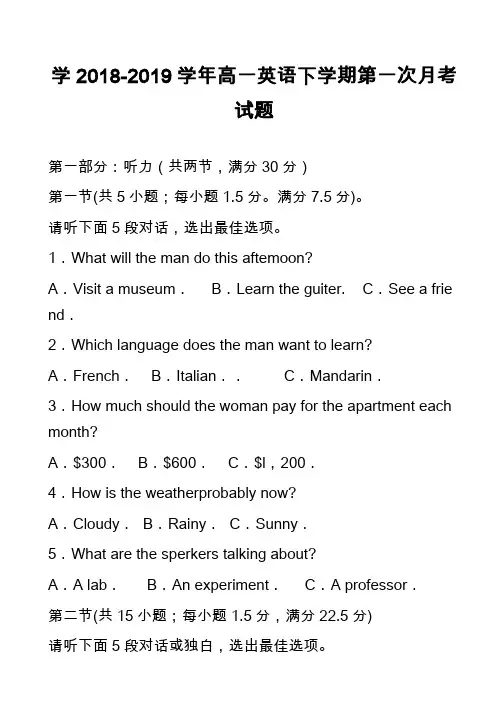
学2018-2019学年高一英语下学期第一次月考试题第一部分:听力(共两节,满分30分)第一节(共5小题;每小题1.5分。
满分7.5分)。
请听下面5段对话,选出最佳选项。
1.What will the man do this aftemoon?A.Visit a museum. B.Learn the guiter. C.See a frie nd.2.Which language does the man want to learn? A.French. B.Italian.. C.Mandarin.3.How much should the woman pay for the apartment each month?A.$300. B.$600. C.$l,200.4.How is the weatherprobably now?A.Cloudy. B.Rainy. C.Sunny.5.What are the sperkers talking about?A.A lab. B.An experiment. C.A professor.第二节(共15小题;每小题1.5分,满分22.5分)请听下面5段对话或独白,选出最佳选项。
请听第6段材料,回答第6、7题。
6.What is Sophie doing?A.Listening to music. B.Eating an apple. c.Reading a history book.7.Who is talking on the phone?A.Danny. B.Jane. C.Ben.请听第7段材料,回答第8、9题。
8. When will the man come back home from the holiday?A .On the 24thB. On the 25thC. On the 26th9. Where will the man go for his holiday?A. To Turkey.B. To Greece.C. To Italy请听第8段材料,回答第10至12题。
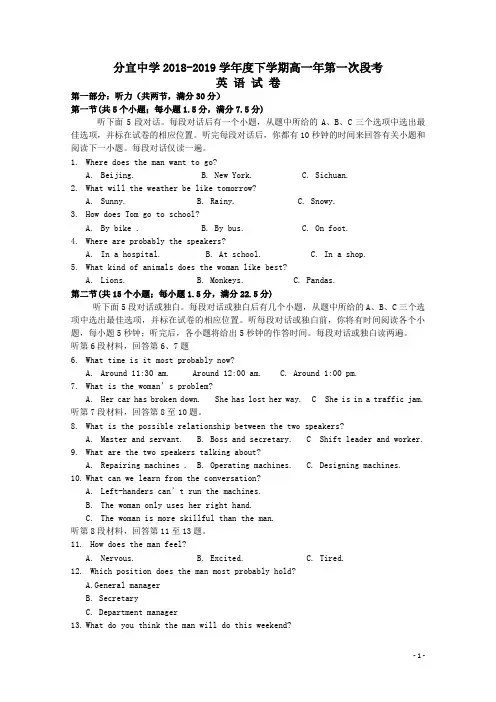
分宜中学2018-2019学年度下学期高一年第一次段考英语试卷第一部分:听力(共两节,满分30分)第一节(共5个小题;每小题1.5分,满分7.5分)听下面5段对话。
每段对话后有一个小题,从题中所给的A、B、C三个选项中选出最佳选项,并标在试卷的相应位置。
听完每段对话后,你都有10秒钟的时间来回答有关小题和阅读下一小题。
每段对话仅读一遍。
1.Where does the man want to go?A.Beijing.B. New York.C. Sichuan.2.What will the weather be like tomorrow?A.Sunny.B. Rainy.C. Snowy.3.How does Tom go to school?A.By bike .B. By bus.C. On foot.4.Where are probably the speakers?A.In a hospital.B. At school.C. In a shop.5.What kind of animals does the woman like best?A.Lions.B. Monkeys.C. Pandas.第二节(共15个小题;每小题1.5分,满分22.5分)听下面5段对话或独白。
每段对话或独白后有几个小题,从题中所给的A、B、C三个选项中选出最佳选项,并标在试卷的相应位置。
听每段对话或独白前,你将有时间阅读各个小题,每小题5秒钟;听完后,各小题将给出5秒钟的作答时间。
每段对话或独白读两遍。
听第6段材料,回答第6、7题6.What time is it most probably now?A.Around 11:30 am. Around 12:00 am. C. Around 1:00 pm.7.What is the woman’s problem?A.Her car has broken down. She has lost her way. C She is in a traffic jam. 听第7段材料,回答第8至10题。
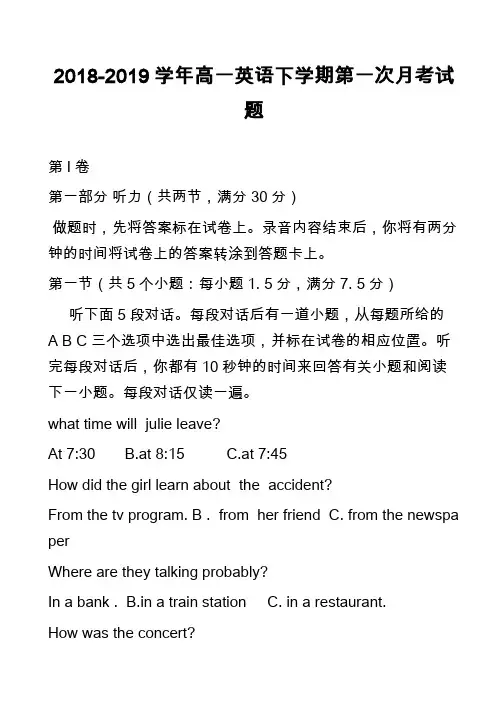
2018-2019学年高一英语下学期第一次月考试题第I卷第一部分听力(共两节,满分30分)做题时,先将答案标在试卷上。
录音内容结束后,你将有两分钟的时间将试卷上的答案转涂到答题卡上。
第一节(共5个小题:每小题1. 5分,满分7. 5分)听下面5段对话。
每段对话后有一道小题,从每题所给的A B C三个选项中选出最佳选项,并标在试卷的相应位置。
听完每段对话后,你都有10秒钟的时间来回答有关小题和阅读下一小题。
每段对话仅读一遍。
what time will julie leave?At 7:30 B.at 8:15 C.at 7:45How did the girl learn about the accident?From the tv program. B . from her friend C. from the newspa perWhere are they talking probably?In a bank . B.in a train station C. in a restaurant.How was the concert?Successful. B. boring C. noisyWhat kind of meals the man like ?Expensive meals. B. restaurant meals C. home-cooked meals 第二节(共15小题;每小题1.5分,满分22.5分)听下面5段对话或独白。
每段对话或独白后有几个小题,从题中所给的A、B、C三个选项中选出最佳选项,并标在试卷的相应位置。
在听每段对话或独白前,你将有时间阅读各个小题,每小题5秒钟;听完后,各个小题将给出5秒钟的作答时间。
每段对话或独白读两遍。
听第6段材料,回答第6至7题。
When will victor pick up his client?At 10:00 am B. at 11:00 am C. at 2:pmhow long will the meeting last ?For there hours B. for one hour C. for two hours听第7段材料,回答第8至9题。
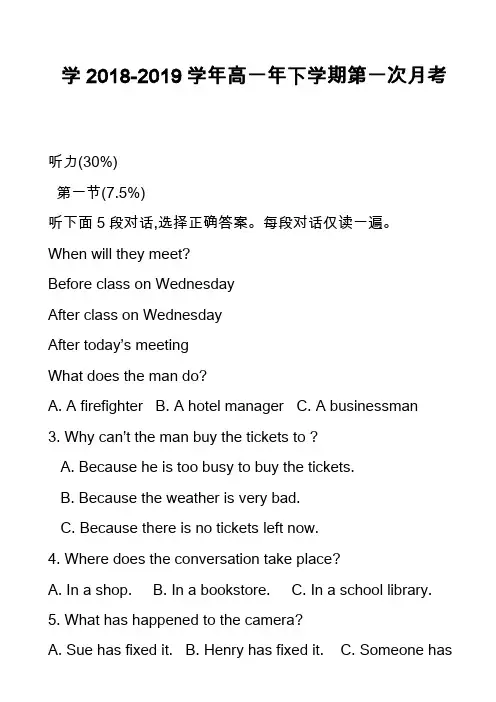
学2018-2019学年高一年下学期第一次月考听力(30%)第一节(7.5%)听下面5段对话,选择正确答案。
每段对话仅读一遍。
When will they meet?Before class on WednesdayAfter class on WednesdayAfter today’s meetingWhat does the man do?A. A firefighterB. A hotel managerC. A businessman3. Why can’t the man buy the tickets to ?A. Because he is too busy to buy the tickets.B. Because the weather is very bad.C. Because there is no tickets left now.4. Where does the conversation take place?A. In a shop.B. In a bookstore.C. In a school library.5. What has happened to the camera?A. Sue has fixed it.B. Henry has fixed it.C. Someone hasfixed it.第二节(22.5%)听第6段材料,回答第6、7题。
6. What’s wrong with the man’s brother?A. There’s something wrong with his mouth.B. There’s something wrong with his leg.C. There’s something wrong with his stomach.7. Where is the man’s brother now?A. At home.B. In hospital.C. In the office.听第7段材料,回答第8、9题。
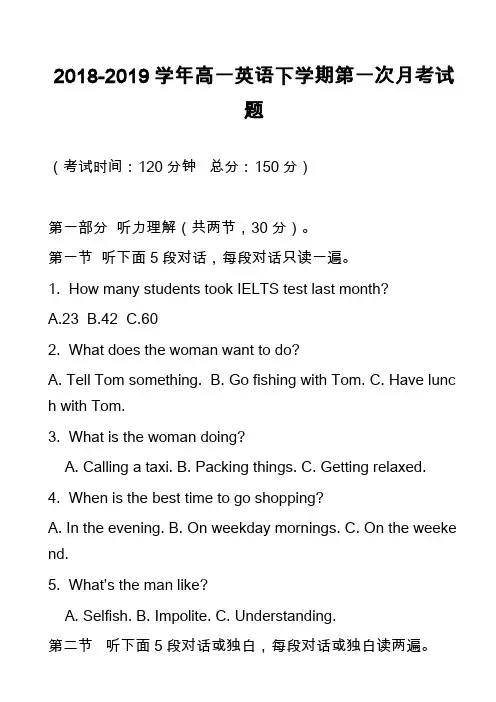
2018-2019学年高一英语下学期第一次月考试题(考试时间:120分钟总分:150分)第一部分听力理解(共两节,30分)。
第一节听下面5段对话,每段对话只读一遍。
1. How many students took IELTS test last month?A.23B.42C.602. What does the woman want to do?A. Tell Tom something.B. Go fishing with Tom.C. Have lunch with Tom.3. What is the woman doing?A. Calling a taxi.B. Packing things.C. Getting relaxed.4. When is the best time to go shopping?A. In the evening.B. On weekday mornings.C. On the weeke nd.5. What’s the man like?A. Selfish.B. Impolite.C. Understanding.第二节听下面5段对话或独白,每段对话或独白读两遍。
6. Why does the woman refuse the man’s invitation?A. She feels unhappy with his words.B. She has a busy sche dule.C. She is having her dinner.7. How long will it take the woman to have lunch and lunch br eak?A. 3 hours.B. 4 hours.C. 5 hours.8. What’s the relationship between the speakers?A. Friends.B. Strangers.C. Workmates.9. What match are the speakers talking about?A. A volleyball match.B. A basketball match.C. A football match.10. What will the special machine be used to do?A. Blow away the fine dust in the smoke.B. Take in the fine dust in the smoke.C. Stop the black smoke from coming out.11. What are the speakers?A. Interviewer and interviewee.B. Factory workers.C. Stud ents.12. What do we know about the steelworks?A. It has done nothing to stop the pollution.B. It is active in controlling the pollution.C. It’s turning better.13. Where does the boy plan to go?A. America.B. South Africa.C. Egypt.14. What will the girl do during the winter holidays?A. She won’t go anywhere because of no money.B. She wil l have to stay at home.C. She will be at Aswan Dam.15. How will the boy go for his trip?A. By train.B. By bus.C. By air.16. What is the girl’s feeling?A. She is hurt.B. She is happy.C. She feels nothing.17. What was the man going to do?A. Have supper with his daughter.B. Pick up his daughter.C. Go home with his daughter.18. Why did the man stop off at a shop?A. To get drinks.B. To get some gas.C. To buy some food.19. Why did the man slow down?A. The cars in front of his began to shake.B. His car was ou t of gas.C. His car was broken.20. What happened according to the passage?A. The man’s car fell off the bridge.B. An earthquake happened. C. Several cars crashed.第二部分阅读理解 (共两节,满分40分)第一节(共15小题;每小题2分,满分30分)阅读下列短文,从每小题后所给的A、B、C、D四个选项中,选出最佳选项。
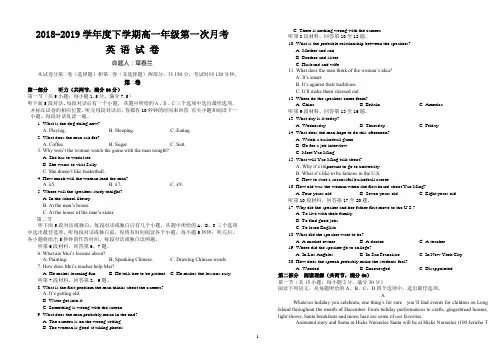
2018-2019学年度下学期高一年级第一次月考英语试卷命题人:章春兰本试卷分第Ⅰ卷(选择题)和第Ⅰ卷(非选择题)两部分。
共150分,考试时间120分钟。
第Ⅰ卷第一部分听力(共两节,满分30分)第一节(共5小题;每小题1.5分,满分7.5)听下面5段对话。
每段对话后有一个小题,从题中所给的A、B、C三个选项中选出最佳选项,并标在试卷的相应位置。
听完每段对话后,你都有10秒钟的时间来回答有关小题和阅读下一小题。
每段对话仅读一遍。
1. What is the dog doing now?A. Playing.B. Sleeping.C. Eating.2. What does the man ask for?A. Coffee.B. Sugar.C. Salt.3. Why won’t the woman watch the game with the man tonight?A. She has to work late.B. She wants to visit Sally.C. She doesn’t like basketball.4. How much will the woman lend the man?A. £5.B. £7.C. £9.5. Where will the speakers study tonight?A. In the school library.B. At the man’s house.C. At the house of the man’s sister.第二节听下面5段对话或独白。
每段对话或独白后有几个小题,从题中所给的A、B、C三个选项中选出最佳选项。
听每段对话或独白前,你将有时间阅读各个小题,每小题5秒钟;听完后,各小题将给出5秒钟的作答时间。
每段对话或独白读两遍。
听第6段材料,回答第6、7题。
6. What are Mei’s lessons about?A. Painting.B. Speaking Chinese.C. Drawing Chinese words.7. How does Mei’s teacher help Mei?A. He makes learning fun.B. He tells her to be patient.C. He makes the lessons easy.听第7段材料,回答第8、9题。
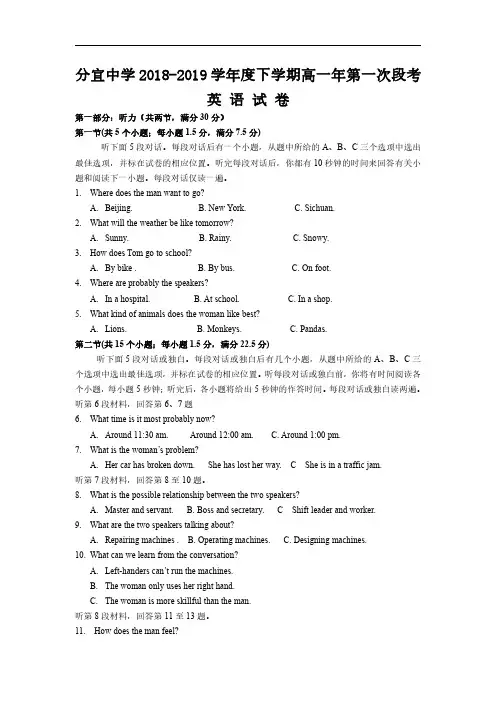
分宜中学2018-2019学年度下学期高一年第一次段考英语试卷第一部分:听力(共两节,满分30分)第一节(共5个小题;每小题1.5分,满分7.5分)听下面5段对话。
每段对话后有一个小题,从题中所给的A、B、C三个选项中选出最佳选项,并标在试卷的相应位置。
听完每段对话后,你都有10秒钟的时间来回答有关小题和阅读下一小题。
每段对话仅读一遍。
1.Where does the man want to go?A.Beijing.B.New York.C.Sichuan.2.What will the weather be like tomorrow?A.Sunny.B.Rainy.C.Snowy.3.How does Tom go to school?A.By bike.B.By bus.C.On foot.4.Where are probably the speakers?A.In a hospital.B.At school.C.In a shop.5.What kind of animals does the woman like best?A.Lions.B.Monkeys.C.Pandas.第二节(共15个小题;每小题1.5分,满分22.5分)听下面5段对话或独白。
每段对话或独白后有几个小题,从题中所给的A、B、C三个选项中选出最佳选项,并标在试卷的相应位置。
听每段对话或独白前,你将有时间阅读各个小题,每小题5秒钟;听完后,各小题将给出5秒钟的作答时间。
每段对话或独白读两遍。
听第6段材料,回答第6、7题6.What time is it most probably now?A.Around11:30am.Around12:00am. C.Around1:00pm.7.What is the woman’s problem?A.Her car has broken down.She has lost her way.C She is in a traffic jam.听第7段材料,回答第8至10题。

姓名,年级:时间:2018~2019学年度第二学期第一次检测高一年级英语学科试题考试时间:120分钟分值:150分本试卷分第Ⅰ卷(选择题)和第Ⅱ卷(非选择题)两部分第Ⅰ卷(选择题)第一部分:听力理解(共两节,满分20分)第一节(共5小题;每小题1分,满分5分)听下面5段对话。
每段对话后有一个小题,从题中所给的A、B、C三个选项中选出最佳选项,并标在试卷的相应位置。
听完每段对话后,你都有10秒钟的时间来回答有关小题和阅读下一小题。
每段对话仅读一遍。
1. What is the man going to do next Wednesday afternoon?A. Have a meeting。
B. Plant some trees。
C. Pick up his mother。
2. What is the man looking for?A. Something to wear。
B。
Something to eat。
C。
Something to play with.3。
Why was the man late?A. His taxi got into an accident。
B. His car broke down. C。
He ran out of gas。
4. Which country is the woman’s family going to visit?A。
France。
B。
Greece。
C. Spain。
5. What are the speakers talking about?A. A novel。
B。
A library。
C。
A hobby.第二节(共15小题;每小题1分,满15分)听下面5段对话。
每段对话后有几个小题,从题中所给的A、B、C三个选项中选出最佳选项,并标在试卷的相应位置。
听每段对话或独白前,你将有时间阅读各个小题,每小题5秒钟;听完后,各小题将给出5秒钟的作答时间。
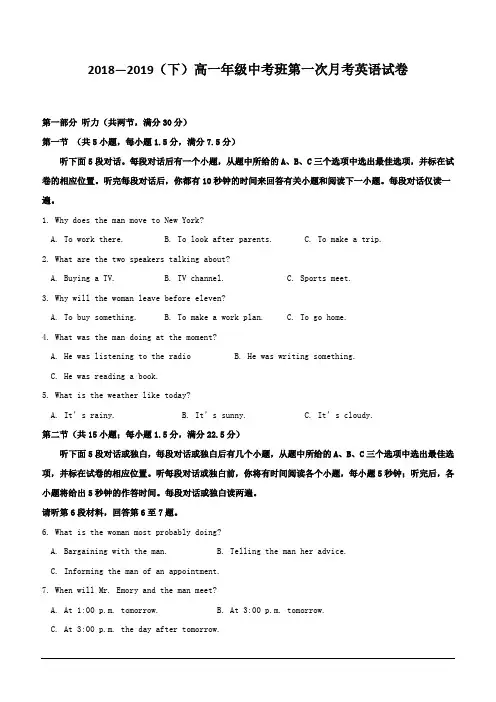
2018—2019(下)高一年级中考班第一次月考英语试卷第一部分听力(共两节,满分30分)第一节(共5小题,每小题1.5分,满分7.5分)听下面5段对话。
每段对话后有一个小题,从题中所给的A、B、C三个选项中选出最佳选项,并标在试卷的相应位置。
听完每段对话后,你都有10秒钟的时间来回答有关小题和阅读下一小题。
每段对话仅读一遍。
1. Why does the man move to New York?A. To work there.B. To look after parents.C. To make a trip.2. What are the two speakers talking about?A. Buying a TV.B. TV channel.C. Sports meet.3. Why will the woman leave before eleven?A. To buy something.B. To make a work plan.C. To go home.4. What was the man doing at the moment?A. He was listening to the radioB. He was writing something.C. He was reading a book.5. What is the weather like today?A. It’s rainy.B. It’s sunny.C. It’s cloudy.第二节(共15小题;每小题1.5分,满分22.5分)听下面5段对话或独白,每段对话或独白后有几个小题,从题中所给的A、B、C三个选项中选出最佳选项,并标在试卷的相应位置。
听每段对话或独白前,你将有时间阅读各个小题,每小题5秒钟;听完后,各小题将给出5秒钟的作答时间。
每段对话或独白读两遍。
请听第6段材料,回答第6至7题。
6. What is the woman most probably doing?A. Bargaining with the man.B. Telling the man her advice.C. Informing the man of an appointment.7. When will Mr. Emory and the man meet?A. At 1:00 p.m. tomorrow.B. At 3:00 p.m. tomorrow.C. At 3:00 p.m. the day after tomorrow.请听第7段材料,回答第8至9题。
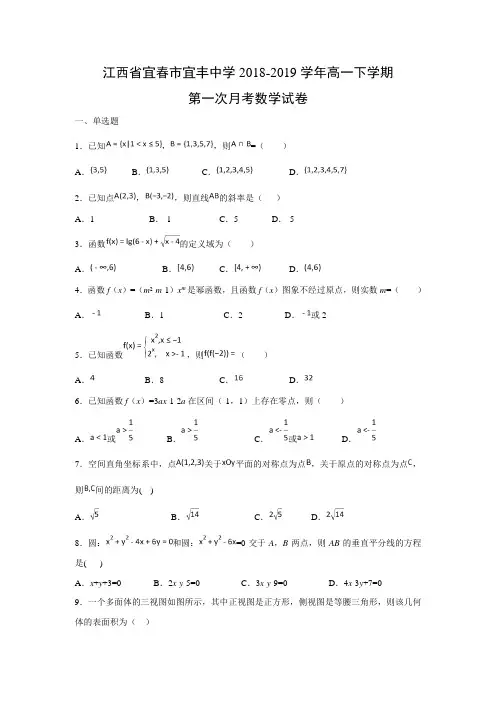
江西省宜春市宜丰中学2018-2019学年高一下学期第一次月考数学试卷一、单选题1.已知,,则=()A.B.C.D.2.已知点,,则直线的斜率是()A.1 B.-1 C.5 D.-53.函数的定义域为()A.B.C.D.4.函数f(x)=(m2-m-1)x m是幂函数,且函数f(x)图象不经过原点,则实数m=()A.B.1 C.2 D.或25.已知函数,则()A.B.8 C.D.6.已知函数f(x)=3ax-1-2a在区间(-1,1)上存在零点,则()A.或B.C.或D.7.空间直角坐标系中,点关于平面的对称点为点,关于原点的对称点为点,则间的距离为( )A.B.C.D.8.圆:和圆:=0交于A,B两点,则AB的垂直平分线的方程是( )A.x+y+3=0 B.2x-y-5=0 C.3x-y-9=0 D.4x-3y+7=09.一个多面体的三视图如图所示,其中正视图是正方形,侧视图是等腰三角形,则该几何体的表面积为()A .168B .98C .108D .8810.直线与、为端点的线段有公共点,则k 的取值范围是( )A .B .C .D .11.已知函数且在上为减函数,则的取值范围为( )A .B .C .D .12.已知为定义在上的奇函数,,且对任意的时,当时,,则不等式的解集为( )A .B .C .D .二、填空题 13.若函数,则________.14.已知一圆经过两点,且它的圆心在直线上,则此圆的方程为______.15.若关于的方程有两个不相等的实数解,则实数的取值范围是__________.16.设点P 是函数()211y x =---的图象上的任意一点,点()(),3Q a a a -∈R ,则PQ 的最小值__________. 三、解答题 17.已知集合,.(1)当时,求;(2)若,求的取值范围.18.已知直线1:220l x y ++=;2:40l mx y n ++=. (1)若12l l ⊥,求m 的值;(2)若12//l l ,且他们的距离为5,求,m n 的值.19.已知函数.(1)若函数在上是单调函数,求实数的取值范围; (2)当,时,不等式恒成立,求实数的范围.20.如图所示,在四棱锥P-ABCD中,底面ABCD是棱长为2的正方形,侧面P AD为正三角形,且面P AD⊥面ABCD,E.F分别为棱AB.PC的中点.(1)求证:EF∥平面P AD;(2)求三棱锥B-EFC的体积.21.已知点,圆:.(1)若点为圆上的动点,求线段中点所形成的曲线的方程;(2)若直线过点,且被(1)中曲线截得的弦长为2,求直线的方程.22.已知函数.(1)若函数是上的偶函数,求实数的值;(2)若,求函数的零点.【参考答案】一、单选题1.A【解析】中的奇数有,故,选A.2.A【解析】直线的斜率.3.B【解析】由题意得:,解得:4≤x<6,故选:B.4.A【解析】∵函数f(x)=(m2-m-1)x m是幂函数,且函数f(x)图象不经过原点,∴,求得m=-1,故选:A.5.C【解析】∵函数,∴f(﹣2)=(﹣2)2=4,f(f(﹣2))=f(4)=24=16.故选:C.6.C【解析】由f(x)=3ax﹣1﹣2a在区间(﹣1,1)上存在零点,则f(﹣1)•f(1)=(﹣3a﹣1﹣2a)(3a﹣1﹣2a)=(﹣5a﹣1)•(a﹣1)<0,解得a>1或a.故选:C.7.C【解析】在空间直角坐标系中,点点关于平面的对称点,关于原点的对称点,则间的距离为,故选C.8.C【解析】由题意得,圆和圆交于两点,则的垂直平分线的方程,就是求两个圆的圆心的连线方程,圆的圆心,圆的圆心,所以所求直线方程为,即,故选C.9.D【解析】由三视图知该几何体是直三棱柱,且三棱柱的高为4,底面是等腰三角形,三角形的底边边长为6,高为4,∴腰长为5,∴底面三角形的周长为5+5+6=16,∴几何体的表面积S=2××6×4+(5+5+6)×4=24+64=88.故选:D.10.B【解析】y=k(x﹣1)过C(1,0),而k AC1,k BC1,故k的范围是(﹣∞,﹣11,+∞),故选:B.11.A【解析】由且,令,则函数的对称轴的方程为,又由函数为单调递增函数,要使得函数且在上为减函数,则当时,则满足,此时无解;当时,则满足,解得,综上可知的取值范围为,故选A.12.C【解析】∵为定义在上的奇函数,∴也为定义在上的奇函数,∵对任意的时,当时,∴为上的单调增函数,又为上的奇函数,∴在上单调递增,由可得,即,∴,即,故选:C.二、填空题13.0【解析】令,则.14.【解析】线段中点的坐标为,直线的斜率为,与它垂直的直线的斜率为,由点斜式得,即,由,解得圆心坐标为,半径为,所以圆的标准方程为.15.或【解析】关于的方程有两个不相等的实数解即直线与的图象有两个不同的交点,作图如下:由图易知:实数的取值范围是或,故答案为:或.16.21-【解析】函数()211y x =---为半圆()()2211,0x y y -+=≤ , 点Q 在直线3y x =- 上,所以PQ 的最小值为圆心()1,0到直线距离减去半径,即1212-=-,三、解答题17.解:(1)当时,,,;(2)若,,即的取值范围是.18. 解:设直线12,l l 的斜率分别为12,k k ,则12k =-、24m k =-. (1)若12l l ⊥,则1212mk k ⨯==-,∴2m =- (2)若12//l l ,则24m-=-,∴8m =.∴2l 可以化简为204nx y ++=,∴1l 与2l 2455n -=28n =或12-19.解:(1)函数的对称轴为,又有函数在上是单调函数,或, 解得或.实数的取值范围为.(2)当,时,恒成立,即恒成立,令,恒成立,函数的对称轴,∴,即,的范围为.20.(1)证明:取PD中点G,连结GF、AG,∵GF为△PDC的中位线,∴GF∥CD且,又AE∥CD且,∴GF∥AE且GF=AE,∴EFGA是平行四边形,则EF∥AG,又EF⊄面P AD,AG⊂面P AD,∴EF∥面P AD;(2)解:取AD中点O,连结PO,∵面P AD⊥面ABCD,△P AD为正三角形,∴PO⊥面ABCD,且,又PC为面ABCD斜线,F为PC中点,∴F到面ABCD距离,故.21.解:(1)设的中点为,则,代入圆:,得,即.圆心到圆圆心的距离为3,∵,∴线段中点所形成的曲线的方程为即;(2)当直线的斜率不存在时,直线方程为:,被圆所截弦长为2;当直线斜率存在时,设直线方程为,即.由弦长公式得,则,解得.所求直线方程为.故所求直线方程为:或.22.解:(1)∵是R上的偶函数,∴,即,∴,整理得,∴,∴.(2)当时,,令,可得,∴,整理得,解得或(舍去),∴.。
江西省2019学年高一下学期第一次月考英语试卷【含答案及解析】姓名___________ 班级____________ 分数__________一、阅读理解1. A cafe in Virginia, America, has come up with a method to convincecustomers to be more polite.A sign advertises different costs for a cup of coffee depending on how polite the customer is when ordering. The prices are listed with the typical phrasesa customer might use when placing their order. They include: “Small coffee”at $5, “small coffee please” at $3 and “hello, one small coffee please” at $1.75.A passer-by took a photo of the sign and posted the image online. This isn’t the first time that a coffee shop has attempted to teach customers a lesson.The Petite Syrah cafe in Nice, on the Fren ch Riviera, charged customers €7for “a coffee”, but a more affordable €4.25 for “a coffee please”.Fabrice Pepino, manager of Petite Syrah, explained the reason: “It startedas a joke because at lunchtime people would come in very stressed and weresomet imes rude to us when they ordered a coffee.” He added: “I know peoplesay that French service can be rude but it’s also true that customers can be rude when they’re busy.”The American cafe will be hoping to follow in the footsteps of the PetiteSyrah caf e as the original coffee shop proved a success in changing customers’ behaviors. Pepino said that he had noticed a huge difference in the behaviorsof his customers after a few days of the sign being on show.1. If a customer orders a coffee politely, the cafe will ________.A. present him/her a gift as a rewardB. charge him/her less moneyC. offer him/her the coffee for freeD. teach him/her a good lesson2. It can be known from the passage that ________.A. the cafe in Virginia is the first coffee shop to do soB. people don’t believe the strategy because it is a jokeC. the French cafe made the rule just for fun at firstD. both French service and French customers are rude3. What do you know about the strategy of the Petite Syrah cafe?A. It is useless.B. It is boring.C. It is unacceptable.D. It is effective.2. A 7.0-magnitude(震级)earthquake attacked Kumamoto, Japan on April 15th, 2016, less than two days after a 6.2-magnitude earthquake rocked the same area. The smaller 6.2-magnitude quake on April 14th killed nine people and injured hundreds more, according to the U.S. Geological Survey. With these two and the memories of the huge 9.0-magnitude earthquake and tsunami(海啸)that destroyd northeast of Japan in 2011 not far from people’s minds, what is it about this part of the world that makes it so active in earthquakes?First of all, Japan is along the so-called Pacific Ring of Fire, which is the most active earthquake area in the world. This “ring” is actually animaginary U-shaped zone that follows the edge(边缘)of the Pacific Ocean, where many of the world’s earthquakes occur.“The earthquake in Kumamoto seems to have been caused by the collision(碰撞)between the Philippines Sea Plate(板块)and the Eurasia Plate,” sai d Paul Caruso, a geophysicist of the USGS. While Japan is no stranger to earthquakes, the 7.0-magnitude earthquake is one of the largest ever recorded in this partof southern Japan, Caruso told Live Science. “The second largest was probably on March 20, 1939 --- there was a magnitude of 6.7 in this area,” he said.“Not all earthquakes cause tsunamis,” Caruso said. In general, there are three key elements that can produce a dangerous earthquake-tsunami combination, he added. First, the earthquake must be at least 7.0-magnitude. Second, the quake’s epicenter(震中)has to be under the ocean, Caruso said.And finally, the earthquake hasn’t to be too deep.“We have quakes around Fiji all the time, but those are sometimes 640 kilometers underground, so they a ren’t going to cause a tsunami,” he said. The one in Kumamoto was about 10 km underground but the epicenter was on land, Caruso said.“There are lots of large aftershocks,” Caruso told Live Science. “And of course, after a large earthquake, buildings are often weakened as a result. Additional damage can be expected. ” People living in the area should expect more shaking in the coming days, according to Caruso. “We can say for certain that there are going to be more aftershocks in this area,” he said. “Exac tlywhen and how big they’re going to be is difficult to say, though. No one can predict that.”1. The earthquake happened on April 15th in Kumamoto ________.A. was the largest one that ever happened thereB. caused the movement of the Philippines Sea Plate and the Eurasia PlateC. was the first one that reached the magnitude of 7.0 in JapanD. brought great destruction to the northeastern part of Japan2. What does the underlined word “elements” in Para 4 mean?A. Conclusions.B. Influences.C. Ingredients.D. Intentions.3. Which inference about the Kumamoto earthquake is the most probably correct?A. It didn’t cause too much destruction to the buildings.B. The epicenter was too deep to cause tsunami.C. The aftershocks were well-controlled.D. It didn’t bring about any powerful tsunamis.4. Which of the following might be the title of the passage?A. Why Are Earthquakes in Japan So Destructive?B. Why Do So many Earthquakes Attack Japan?C. Why Do Earthquakes Cause Tsunamis in Japan?D. Why Do So Many Earthquakes Happen?3. The Iranian-American Maz Jobrani knew early in life that he wanted to become an actor or a comedian. Jobrani came to California with his parentsfrom Iran when he was six and attended school there. His introduction toacting was an experience of trying out for a school play. “When I was 12, I tried out for the school play and fell in love with the stage...” said Jobrani, “I have friends who were funnier than I was!”Jobrani tried an ordinary career path, studying political science in college and even starting a Ph.D. Program at UCLA. But the comedy of Eddie Murphy wasa more powerful influence. “I’m a comedian because I’m a fan of comedy. I love watching comedy and I believe I discovered Eddie Murphy probably by watching “Saturday Night Live” and just then I wanted to be like Eddie Murphy,” Jobrani said.Now as a full-time comedian, Maz Jobrani uses comedy to bridge the cultural divide. His performances both laugh at extremism and challenge Americanbias(偏见)of Muslims. And his recent movie does the same. He co-wrote and started in “Jimmy Vestvood: American Hero.”“The movie is about a man who loves America, who wins the green card comingto America from Iran. He wants to be a policeman. But once he comes to America,he realizes America doesn’t accept immigrants(移民)the way he thought they would and the only job he can find is working as a security guard(保安)andfrom there he has to go on to save the world.”“ This comedy has a message of show ing Iranians in a very different light, a fun light that most Americans aren’t used to seeing,” he said. For example, he feared when he first heard the phrase “axis of evil,” which is used to describe such countries as Ira n. But he soon realized it could also make a great name for a series of shows. So, in 2005, the “Axis of Evil Comedy”Tour came. The shows featured Jobrani and three other comedians of Middle Eastern descent(血统).The group first appeared on the American tel evision channel Comedy Central.It’s a good feeling when you realize it’s working. It’s the worst when you’re doing stand-up (单人说笑表演的)comedy and the audience doesn’t relate to you. But their laugh is like a drug keeping feeding you. It’s kind of like I were surfing. So whether it’s doin g stand-up comedy or putting on a movie, your goal as a comedian is to make people laugh.1. By introducing his comedian career, Jobrani tends to tell us that ________.A. he is actually a born comedianB. Americans’ lifestyle makes him a comedianC. Eddie Murphy has a great influence on himD. Murphy’s plays made him first like comedy2. What do you know about Jobrani’s film “American Hero”?A. It is all about his personal experiences.B. It is about Iranians who are against Americans.C. It mainly plays a joke on the US immigrant policy.D. It makes fun of American bias of Muslims.3. What do you learn about the “Axis of Evil Comedy” Tour?A. It turns what’s frightening into something funny.B. It is performed by Jobrani and two Iranians.C. It blames the US’ unfriendly attitude to Iran.D. It didn’t work well at the very beginning.4. To comedians, ________.A. stand-up comedy is difficult to perform.B. the audience’s laughter is their power.C. doing stand-up comedy is just like surfing.4. I have always been somebody who often alternated(交替)between hoping to be alone and hoping to be with others. The thing was, I only wanted to be with others in a very particular way. I wanted to feel warmth between me and theother person. I wanted to feel safe and comfortable. I wanted to feel close.If my relationship with someone didn’t have closeness, it tended to make me feel lonlier than just being alone.I found most of the advice out there about how to get over lonelinessfutile . “Put yourself out there more!” the experts said. “Meet more people and you will finally find good friendships.” That only sounded reasonable. Most of us already have people in our lives with whom we feel that spark(火花)of connection, and we just do n’t know how to properly fan the flames. We don’t know how to move from common interacting with someone to becoming close. In other words, I’ve found that most of us who fight against loneliness donot lack access to other people. That’s not the source of the pain.The source of the pain is the lack of a certain feeling in our relationships. And that feeling is closeness. This feel of closeness is what you really want when you are lonely. The feeling of closeness arises between two people when they both feel that the other understands them well and cares about them deeply. I call these two important qualities of closeness “knowing and caring”.Taken together, knowing and caring are a powerful combination. They say tothe other person, “Not only do I see th e real you, but I want to keep thereal you well.” This is the message you will give and receive from close relationships. Getting to know others in the way that improves closeness means coming to understand them from their own perspective(角度). Closeness d oesn’t have to be something that happens by accident--- it is within your control to create. Starting now, you really can stop being lonely.1. What does the underlined word “futile” mean?A. Unhelpful.B. Wonderful.C. Useful.D. Unbelievable.2. According to the author, most people who feel lonely _______ .A. should make more new friendsB. don’t lack chances to contact other peopleC. don’t know how to express their feelingsD. refuse to ch ange their attitudes toward others3. According to the passage, the feeling of closeness is ______ .A. what we really need in our daily lifeB. something we can’t control or createC. based on understanding and valuing each otherD. the most important for building a good relationship4. To build a close relationship with others, we should ______ .A. learn to look after othersB. share our thoughts and feelingsC. spend more time staying with othersD. think more from others’s points of view二、七选五5.Things People Over 50 Wish They’d Done Differently At 25Save more money. Retirement is no joke, as you’ll learn by 50. As you stareat the poor reality of your retirement, you might find yourself counting every penny you wasted on worthless things. So pack your lunch, find street parkingor take the bus. 1.Travel more. You’re only young once. So before you get tied down by responsibilities of a spouse (配偶)and kids, it’s a good idea to explore the world and all it has to offer. Consider working abroad. 2. Just go somewhere that will make you look up and around rather than down at your smart phone. Slow down. Too many of us waste precious moments because we’re too busy connecting to our digital products or on social media. Life is short. Enjoy it. We think a reader put it perfectly: “I would not have been so busy to be successful and work 80 hours a week. 3. I would have defined myself by more than what I did for a living.”4. As the saying goes, nobody can take your accomplishments away from you. Education is one of those accomplishments. Many readers wished they would have either gone to college. Whether it’s bad to land you the career of your dreams, or to meet people from different walks of life or to learn to seethings a little differently, education is always a good choice.5. By 25 you might have noticed your metabolism(新陈代谢)slowing down.Looking after yourself at this time is about creating habits (and breaking bad ones) that will lead to a long life in which you’re healthy enough to do everything you want to do.A. Get a better education.B. Consider your health.C. I would have enjoyed my life slowly.D. Visit the city you dream about all day.E. Focus on trying to build a good credit history.F. Remember that a penny saved is a penny earned.G. So never be afraid to stand up for yourself and speak your mind.三、完形填空6. Born without the right hand, 12-year-old Cassie Stewart often had to sit out during music classes. Cassie was sad that she couldn’t take ____ and would quietly walk toward the back of the ____ .Now she doesn’t have to, thanks to an _____ by a local high school student. Nicholas Brown, 15, ____ and tested a 3-printed prosthesis(义肢)for Cassie and Andrew Mindy, another student who also has a ____ , to use during m usic classes. “I wouldn’t r eally call it a prosthetic hand,” said technology _____ , Brad Fessler, who helped Nicholas _______ the project. “it’s a prostheses ______ made for playing instruments. Generally, in the prostheses world, everything is custom-made to _____ different people,” Fessler said. “ in this case, we were able to use the same exact prosthesis for each student, ____ their sizes are different. Everything is designed to be adjustable. They put the prosthesis on, and they c an use their other hand to ______ it.”The idea for the project was born when Cassie’s music teacher, knowing Fessler had just bought a 3-D printer, emailed him to see _____ he could find a way to help her students. Immediately, Fessler thought of Nicholas, one of his ______ students. “ He is really brilliant,” Fessler said. “ He just ______ on things really quickly.”They worked together to find a(n) ______ for Cassie and Andrew. “Coming up with the original idea was the hardest part,” Nicholas said. “But the_______ of it was just improving the idea and finding out what works.”They ____ Cassie and Andrew with the final product this week. “I was so glad that she could use it and that it was actually _____ ,” Nichol as said. Cassie was most _____ about the guitar. “I think it’s a really cool instrument,” she said. “I’m _______ they did it for me,” she added.1. A. care B. part C. action D. interest2. A. door B. office C. classroom D. playground3. A. example B. experiment C. instruction D. invention4. A. used B. bought C. repaired D. designed5. A. question B. concert C. talent D. disability6. A. fan B. student C. teacher D. prizewinner7. A. on B. for C. with D. into8. A. surely B. specifically C. suddenly D. secretly9. A. fit B. surprise C. recognize D. challenge10. A. even though B. because C. as though D. unless11. A. wear B. play C. adjust D. touch12. A. when B. if C. how D. why13. A. star B. university C. poor D. honest14. A. misses out B. picks up C. looks back D. comes down15. A. arm B. doctor C. instrument D. solution16. A. rest B. fact C. meaning D. difficulty17. A. treated B. examined C. presented D. filled18. A. changing B. working C. existing D. appearing19. A. excited B. strict C. worried D. confused20. A. sorry B. satisfied C. confident D. grateful四、短文填空7.Keeping a diary in English is one of the effective ways to improve our English writing ability.1. (compare) with other forms of writing, it is shorter and takes2. (little) time. It can help us to develop the habit of thinking in English.3. we persist in the practice, gradually we’ll learn how to express4. (we)in English. When keeping a diary in English, we run up against many 5. (difficult). In the first place, 6. often happens that we have trouble 7. (find) appropriate words and phrases to give expression to our mind. Secondly, there are many idiomatic ways of saying things in Chinese. And it is 8. (extreme) hard for us to put them into English properly.As far as I am concerned, my suggestion is 9. we should always have a notebook and a Chinese-English dictionary within easy reach. We can also turnto our English teacher for help, if necessary. In short, I believe that it is 10. great use to keep a diary in English for the development of our writing skills.五、短文改错8. 假定英语课上老师要求同桌之间交换修改作文,请你修改你同桌写的以下作文。
2018-2019学年江西省宜春市上高二中高一下学期第一次月考试题英语第一部分听力(共两节,满分30分)做题时,先将答案标在试卷上。
录音内容结束后,你将有两分钟的时间将试卷上的答案转涂到答题卡上。
第一节(共5小題;每小题1.5分,满分7.5分)听下面5段对话。
每段对话后有一个小题,从题中所给的A、B、C三个选项中选出最佳选项。
听完每段对话后,你都有10秒钟的时间来回答有关小题和阅读下一小题。
每段对话仅读一遍。
1. What is the dog doing now?A. Playing.B. Sleeping.C. Eating.2. What does the man ask for?A. Coffee.B. Sugar.C. Salt.3. Why won’t the woman watch the game with the man tonight?A. She has to work late.B. She wants to visit Sally.C. She doesn’t like basketball.4. How much will the woman lend the man?A. £5.B. £7.C. £9.5. Where will the speakers study tonight?A. In the school library.B. At the man’s house.C. At the house of the man’s sister.第二节(共15小题;每小题1.5分,满分22.5分)听下面5段对话或独白。
每段对话或独白后有几个小题,从题中所给的A、B、C三个选项中选出最佳选项。
听每段对话或独白前,你将有时间阅读各个小题,每小题5秒钟;听完后,各小题将给出5秒钟的作答时间。
每段对话或独白读两遍。
听第6段材料,回答第6、7题。
江西省宜春市上高二中2018-2019学年高一英语下学期第一次月考试题总分:150分时量:120分钟第一部分听力(共两节,满分30分)做题时,先将答案标在试卷上。
录音内容结束后,你将有两分钟的时间将试卷上的答案转涂到答题卡上。
第一节(共5小題;每小题1.5分,满分7.5分)听下面5段对话。
每段对话后有一个小题,从题中所给的A、B、C三个选项中选出最佳选项。
听完每段对话后,你都有10秒钟的时间来回答有关小题和阅读下一小题。
每段对话仅读一遍。
1. What is the dog doing now?A. Playing.B. Sleeping.C. Eating.2. What does the man ask for?A. Coffee.B. Sugar.C. Salt.3. Why won’t the woman watch the game with the man tonight?A. She has to work late.B. She wants to visit Sally.C. She doesn’t like basketball.4. How much will the woman lend the man?A. £5.B. £7.C. £9.5. Where will the speakers study tonight?A. In the school library.B. At the man’s house.C. At the house of the man’s sister.第二节(共15小题;每小题1.5分,满分22.5分)听下面5段对话或独白。
每段对话或独白后有几个小题,从题中所给的A、B、C三个选项中选出最佳选项。
听每段对话或独白前,你将有时间阅读各个小题,每小题5秒钟;听完后,各小题将给出5秒钟的作答时间。
每段对话或独白读两遍。
2018-2019学年高一英语下学期第一次月考试题考试时间:120分钟满分:150分第I卷第一部分听力(共两节,满分30分)(共5小题,每小题1.5分,满分7.5分):请听下面五段对话,选出最佳选项。
1.Where does the conversation probably take place?A. In a restaurant.B. In a furniture store. C . In the woman’s company2.What does the man want to do first?A. See the elephant.B. Have a cup of tea.C. Watch the dolphin show3.What is the woman probably going to do?A. Make a list.B. Do some shopping.C. Ma ke a chocolate pie.4.Why does the woman look upset?A. She experienced a theft.B. She was given a par king ticket.C. She couldn’t find a parking space.5. How will the woman go to the city church?A. By bike.B. By bus.C. By car.第二节(共15小题,每小题1.5分,满分22.5分):请听第6段材料,回答第6和第7两个小题。
6.What activities is the man organizing?A. A school union.B. A birthday party.C. A meeting7.Why does the woman recommend the Omni Hotel?A. The price is quite reasonable.B. She likes the party rooms there.C. Her brother works there.请听第7段材料,回答第8和第9两个小题。
宜丰中学2018-2019年(下)高一开学考英语试卷第一部分听力(共两节,满分30分)第一节(共5小题;每小题1. 5分,满分7. 5分)听下面5段对话。
每段对话后有一个小题,从题中所给的A、B、C三个选项中选出最佳选项,并标在试卷的相应位置。
听完每段对话后,你都有10秒钟的时间来回答有关小题和阅读下一小题。
每段对话仅读一遍。
1. What does the man promise to do?A. Lend the woman his camera.B. Return the camera tomorrow.C. Help to fix the camera.2. What will the man do?A. Listen to the radio.B. Read a novel.C. Watch TV3. On what day will the man see Bose?A. Thursday.B. Wednesday.C. Tuesday.4. What’s the man talking about?A. Old times.B. A football match.C. Graduation plan.5. What can we know about the local shops?A. They are open for 12 hours a day.B. They stay open longer at weekends.C. They open between 9:00 a. m. and 1 0:00 P. m.第二节(共15小题;每小题1. 5分,满分22. 5分)听下面5段对话或独白。
每段对话或独白后有几个小题,从题中所给的A、B、C三个选项中选出最佳选项,并标在试卷的相应位置。
听每段对话或独白前,你将有时间阅读各个小题,每小题5秒钟;听完后,各小题将给出5秒钟的作答时间:每段对话或独自读两遍。
宜丰中学2018-2019年(下)高一开学考英语试卷第一部分听力(共两节,满分30分)第一节(共5小题;每小题1. 5分,满分7. 5分)听下面5段对话。
每段对话后有一个小题,从题中所给的A、B、C三个选项中选出最佳选项,并标在试卷的相应位置。
听完每段对话后,你都有10秒钟的时间来回答有关小题和阅读下一小题。
每段对话仅读一遍。
1. What does the man promise to do?A. Lend the woman his camera.B. Return the camera tomorrow.C. Help to fix the camera.2. What will the man do?A. Listen to the radio.B. Read a novel.C. Watch TV3. On what day will the man see Bose?A. Thursday.B. Wednesday.C. Tuesday.4. What’s the man talking about?A. Old times.B. A football match.C. Graduation plan.5. What can we know about the local shops?A. They are open for 12 hours a day.B. They stay open longer at weekends.C. They open between 9:00 a. m. and 1 0:00 P. m.第二节(共15小题;每小题1. 5分,满分22. 5分)听下面5段对话或独白。
每段对话或独白后有几个小题,从题中所给的A、B、C三个选项中选出最佳选项,并标在试卷的相应位置。
听每段对话或独白前,你将有时间阅读各个小题,每小题5秒钟;听完后,各小题将给出5秒钟的作答时间:每段对话或独自读两遍。
听第6段材料,回答第6、7题。
6. What has Sheela invited the woman to do?A. See a show.B. Go out for dinner.C. Attend a party.7. What time will the man pick up the woman tomorrow?A. At 5:00.B. At 5:30.C. At 6:00.听第7段材料,回答第8、9题。
8. What’s the man worried about?A. He’ll fail the piano exam.B. He can’t win the talent show.C. He’ll lose his scholarship.9. What does the woman advise the man to do?A. Put off studies.B. Make a timetable.C. Do more piano practice.听第8段材料,回答第10至12题。
10. Where does the conversation take place?A. In a hotel.B. In a shop.C. In a restaurant.11. How much is the bill?A. $524.B. $520.C. $500.12. How will the woman pay for the bill probably?A. By cash.B. By credit card.C. By cheque.听第9段材料,回答第13至16题。
13. What’s the weather like now?A. Rainy.B. Cloudy.C. Sunny.14. What does the man think of the weather forecast?A. Unreliable.B. Helpful.C. Too late.15. What will the man do next?A. Watch videos.B. Get some sleep.C. Visit a museum.16. What’s the most probable relationship between the speakers?A. Guide and tourist.B. Friends.C. Husband and wife.听第1 0段材料,回答第1 7至20题。
17. Why did Gordon decide to build the theme park?A. There were no theme parks for his disabled daughter.B. It was his childhood dream.C. He thought it was a good business.18. Wh0 does the theme park welcome?A. Only the disabled.B. Every person.C. Members of the organization.19. When did the park open?A. In 2005.B. In2007.C. In 20lO.20. How many visitors has the park received since it opened?A. Above l million.B. Above 50 million.C. Above 67 million.第二部分阅读理解(共两节,满分40分)第一篇(共15小题;每小题2分,满分30分)阅读A、B、C和D四篇短文,在每题所给的四个选项中选出符合题意的最佳项。
AOne day, a clergyman(牧师)was walking down the street when he came across a group of boys, all of whom were between ten and twelve years of age.The group surrounded a dog. Thinking that the boys were hurting the dog, he went over and asked, “What are you doing with that dog?”One of the boys replied, “This dog is just an old neighbourhood stray(走失的狗). We all want him, but only one of us can take him home. So we’ve decided that whichever one of us can tell the biggest lie will get to keep the dog. ”Of course, the clergyman was surprised at this. “You boys shouldn’t be having a contest telling lies!” he exclaimed. He then launched into a ten-minute sermon(说教)about lying, starting with, “Don’t you boys know it’s a sin(罪过)to lie?”and ending up with, “why, when I was your age, I never told a lie. ”There was a dead silence. Just as the clergyman was beginning to think he’d gotten through to them, the smallest boy gave a deep sigh and said, “All right, give him the dog. ”21. Why did the clergyman go close to the group of boys?A. Because he thought the boys were doing something interesting.B. Because he thought the boys were doing something wrong.C. Because he liked children very much.D. Because he wanted to take part in the boys’ game.22. What were the boys doing at that time?A. They were hurting the dog.B. They were helping the dog.C. They were arguing about who should keep the dog.D. They were talking about how to help the dog.23. The boys probably felt when they heard what the clergyman said.A. angryB. happyC. surprisedD. worried24. Why did the smallest boy want to give the dog to the clergyman?A. Because he wanted to show his respect for the old.B. Because he didn’t want to keep the dog himself.C. Because he thought the clergyman needed the dog most.D. Because he thought the clergyman won their contest.BThe monarch is one of the most beautiful butterflies. It is famous for its yearly migration (迁徙)from the northern part of North America to Mexico. There, millions of monarchs spend the winter packed closely together in one small area. This migration is one of the greatest wonders of nature. Yet this behavior has now put the monarch at risk.Every September, millions of monarchs from the United States fly to Mexico. After about two months of flying time, they reach their sanctuary(庇护所)in central Mexico. Then, in the Warm climate of private and quiet valleys, far from most human activity, the butterflies create one of nature’s great scenes. They cover every tree with bright color. The show lasts until spring, when the butterflies return north. While they are all crowded together, the monarchs are highly weak. If the environment in those valleys was disturbed(打扰), the whole species could be hurt or even wiped out. That is why for many years scientists who knew about the monarchs’winter sanctuary kept the location a secret.In recent years, however, the monarchs’ secret has been discovered. Today, the butterflies’ winter sanctuary is crowded with tourists, who disturb the environment. Worse still, local farmers who need more land to farm have begun to take up the area, They are cutting down trees, making it difficult for the butterflies to survive.They should not farm in the monarchs’ sanctuary.Concerned people should act immediately to protect the species’winter sanctuary. Local farmers must be aided so that they no longer need to take land from the butterflies. Tourist visits to the butterflies’ hidden valleys must also be limited. Unless these steps are taken soon, in a few years the monarch butterfly of North America may be just a beautiful memory.25. What do we know about monarch butterflies?A. They fly to the US in autumn.B. They spend the winter in a pack.C. They are the most beautiful butterflies.D. They have been known to human beings until recent years.26. What is Paragraph 2 mainly about?A. The monarchs’ diet.B. The monarchs’ colors.C. The monarchs’ life cycle.D. The monarchs’ migration.27. Why did scientists keep the monarchs’ winter sanctuary a secret?A. To keep the valleys from being destroyed.B. To stop farmers from cutting down trees.C. To do their research secretly.D. To protect the monarchs.28. What is the purpose of the text?A. To tell about a great place to watch monarch butterflies.B. To provide information about monarch butterflies.C. To ask people to save monarch butterflies.D. To call on people to protect the environmentCIf you are having trouble falling asleep, you are in good company. About 65% of Americans said they have sleeping problems a few nights each week, according to a recent study by the National Sleep Foundation. Sleeping too little can lead to a higher risk of becoming fat and getting depressed(沮丧的). But before you go to a doctor for advice, it is worth examining your sleeping habits one more time. Someof your favorite evening habits may have something to do with the sleeping problems. Setting a Bright Alarm ClockThe light of your bright alarm clock can prevent you from falling asleep. You can make your room as dark as possible. Cover the bright numbers with a book or consider buying a small travel clock. Your cellphone alarm may also do the trick. Counting SheepWhen you just can’t fall asleep, it’s useless to stay in bed to count sheep. If you’ve been trying to fall asleep for more than 30 minutes, the National Sleep Foundation suggests you get up to do some reading or watch TV for a while. Such activities will make you sleepy. Before you know it, you’ll be going back to bed really tired.3. Exercising Late at NightDaytime workouts(锻炼) will keep you full of energy for hours. That’s why you don’t want to exercise within three hours of hitting the sack. Fierce(剧烈的) physical activity raise your body temperature and pumps your energy level—both are bad for a good night’s sleep.29. What can we learn from the first sentence of the passage?A. It’s not good to fail to fall asleep at night.B. People in a good company often have sleeping problems.C. There are many people who have sleeping problems.D. You should find someone to talk to if you can’t fall asleep.30. Which of the following is NOT mentioned in the passage?A. The bad results o f getting too little sleep.B. Why the bright alarm clock keeps you awake.C. What to do if you can’t fall asleep after 30 minutes.D. Why watching TV and reading books make people sleepy.31. By writing the passage, the writer mainly wants to tell us _______.A. why so many people can’t sleep well at nightB. how to enjoy a good night’s sleepC. that sleeping problems are troubling more and more peopleD. that people may solve their sleeping problems by some habitsDA scientist turns out to be able to see the future by offering each of some four-year-olds a piece of candy and watching how he or she deals with it. Some children reach eagerly for the treat they see. Some last a few minutes before they give in. But others are determined to wait until the last moment.By the time the children reach high school something remarkable has happened.A survey found that those who as four-year-olds had enough self-control to hold out generally grew up to be more popular, adventurous, confident and dependable. The children who gave in to temptation(诱惑)early were more likely to be lonely, easily frustrated and inflexible(顽固的).Actually, the ability to delay reward is a sign of emotional(情感) intelligence which doesn’t show up on an IQ test.The hardware of the brain and the software of the mind have long been scientists’concerns. But brain theory can’t explain what we wonder about most, like the question why some people remain upbeat in the face of troubles that would sink a less resistant(抵制的) soul.Here comes the opinion of Daniel Goleman, writer of Emotional Intelligence:When it comes to predicting people’s success, brain ability measured by IQ may actually matter less than the qualities of mind once thought of as“character”. EQ is not the opposite of IQ. What researchers have been trying to understand is how they work together;how one’s ability to handle stress, for example, affects the ability to concentrate and put intelligence to use. Among the ingredients(要素)for success, researchers now generally agree that IQ counts for about 20%;the rest depends on everything from social class to luck.While many researchers in this relatively new field are glad to see emotional intelligence finally taken seriously, some few fear EQ invites misuse.32. The experiment with the four-year-olds makes it clear that .A. the age of 4 is a good time for scientific experimentB. emotional intelligence won’t show up until adulthoodC. the ability of self-control plays a role in personal successD. candy can be used to measure a person’s emotional intelligence33. Which of the following is true of EQ and IQ according to the text?A. The higher a person’s EQ is, the higher his or her IQ is.B. The higher a person’s IQ is, the higher his or her EQ is.C. Some people can be blessed with lots of both, but some with little of either.D. Scientists are trying to discover the way in which EQ and IQ work together34. The underlined word“upbeat”in Paragraph 4 probably means “”A. kindB. floatingC. excitedD. optimistic(乐观的)35. What is most likely to be written in the paragraph that follows?A. Information about famous people with high EQ.B. Examples showing the bad voice about EQ.C. Some reasons why EQ is relatively new field.D. Strong demands for basic emotional education.第二节(共5小题;每小题2分,满分10 分)根据短文内容,从短文后的选项中选出能填入空白处的最佳选项。